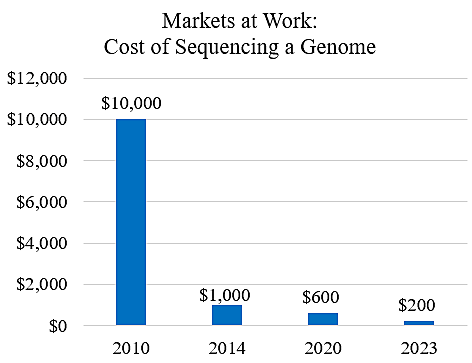By Chris Edwards and Ilana Blumsack of Cato.
"The Wall Street Journal recently profiled companies racing to slash the cost of genome sequencing. The progress has been remarkable, and the advances may generate vast benefits for human health. The article says that two decades ago it cost millions of dollars to sequence a genome, but since then one company has led the way in driving costs down:
“Illumina in 2010 released a machine enabling genome sequencing for about $10,000… Subsequent innovations dropped the cost to $1,000 in 2014, and to $600 in 2020. Illumina is rolling out a new instrument series, NovaSeq X, that reduces it to $200.”
Illumina Inc was founded in 1998 in San Diego and initially funded by $8.5 million in venture capital. It later raised equity in public markets. Bravo to Illumina’s team of young founders, who not only made initial breakthroughs, but have also grown their company at a hectic pace and “dominated the sector,” according the Journal.
The newspaper reports that the promise is huge. DNA sequencing “fuels biological research and the hunt for new medicines and diagnostics.” The “$200 genome will drive the technology into routine care,” such as use in prenatal and cancer testing, which “has exploded in recent years as costs have declined.”
The large market potential is drawing well‐financed competitors to Illumina. The Journal points to Element Biosciences, which has raised more than $400 million in venture capital and “says its instruments can sequence a genome for $200.” And there is Ultima Genomics, which has raised more than $600 million “to develop technology to cut the cost to $100.”
The government has played a role. USAspending.gov indicates that Ultima Genomics received about $4 million in federal grants and Illumina about $7 million. In addition, the companies have received federal contracts. The Journal mentions the public‐sector Human Genome Project, but does not mention the crucial private‐sector role of Craig Venter in helping to launch the industry.
All in all, it appears that rapid advances in genome sequencing are being mainly driven by entrepreneurs, private capital, and competitive markets. As discussed here, wealth is central to fueling growth and technological advance, and the genomics industry is a great example."

No comments:
Post a Comment
Note: Only a member of this blog may post a comment.